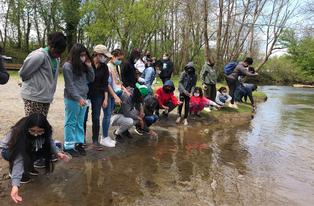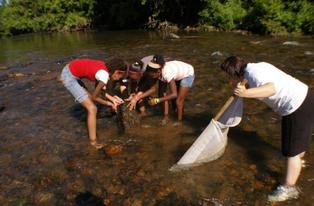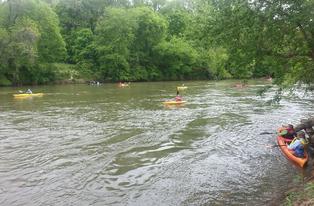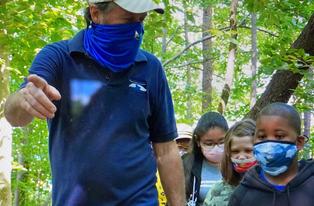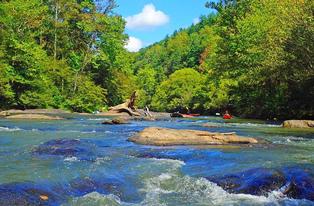
Threats & DRBA's Response
There are many threats to our local environment right now. DRBA works with local, regional, state and national partners to help protect the Dan River Basin for future generations. The Stewardship Fund provides funding to obtain special expertise when needed to stop the threat.
AI/Data Centers in the Dan River Basin
Mountain Valley Pipeline - Southgate Amendment
Information from VA DEQ’s Website: https://www.deq.virginia.gov/news-info/shortcuts/topics-of-interest/mountain-valley-pipeline-southgate-amendment
The proposed project includes the construction of approximately 31.3 miles of 30-inch diameter pipeline; with 26.1 of those miles to be located in Pittsylvania County, Virginia. (The remaining 5.2 miles of pipeline would be located in Rockingham County, North Carolina.) The purpose of the pipeline is to transport natural gas from an interconnection point with the MVP Main Line project in Virginia to an interconnection point with the East Tennessee Natural Gas, LLC, system in North Carolina.
In Virginia, the construction of natural gas pipelines is regulated under several environmental programs.
- A Public Notice of the Draft Virginia Water Protection (VWP) Permit for the MVP Southgate Amendment project was published on October 16, 2025. Click here to view the Draft VWP Permit.
- The Public Comment Period for the Draft VWP Permit is open through December 5, 2025.
- A Public Hearing for the Southgate Amendment project's Draft VWP Permit was held on November 20, 2025 in Chatham, Virginia. DEQ staff presided over the hearing, and a court reporter was present to document comments provided by the public and other meeting attendees on the draft permit.
- After the Public Comment Period has ended, DEQ will review all comments received and prepare a set of comment summary and response documents for the Southgate Amendment project's VWP Permit. Once those documents are complete, DEQ will publish them on the Virginia Regulatory Town Hall website and post them to DEQ’s online calendar. At that time, DEQ will also publish and post information regarding the time, date, and location of the next Public Hearing for the Summary of Comments on the project's draft VWP Permit.
------------
- After the Public Comment Period has ended, DEQ will review all comments received and prepare a set of comment summary and response documents for the Southgate Amendment project's VWP Permit. Once those documents are complete, DEQ will publish them on the Virginia Regulatory Town Hall website and post them to DEQ’s online calendar. At that time, DEQ will also publish and post information regarding the time, date, and location of the next Public Hearing for the Summary of Comments on the project's draft VWP Permit.
DRBA’s Response, please use what fits your thoughts best:
EMAIL TO: mvpsouthgate.vwp@deq.virginia.gov
My name is ___ and I am from ____ and have concerns about the MVP Southgate Project.
It’s from this perspective of stewardship and community commitment that I speak in strong opposition to granting the 401 Water Quality Certification for the MVP Southgate project.
There has been zero credible evidence to demonstrate that this pipeline, or the methane gas it would supply, is needed today or will be needed in the future. Utilities have not provided hard evidence of demand that cannot be met through existing infrastructure or cleaner, more cost-effective alternatives. Approving a 401 permit for a project without demonstrated necessity would put communities at risk for a pipeline that is not even justified.
These risks include widespread threats to our waters. The project would cut through more than 4 dozen water bodies and 3 dozen wetlands. Pipeline construction is known to increase sediment and turbidity which degrades water quality and harms fish and other aquatic life. Wetlands, which play a critical role in flood reduction and habitat protection would also be polluted and disturbed. Approving a 401 permit for a project, that has not been shown to have a valid need in the first place, would directly jeopardize these vital resources would be a mistake.
This is not only an environmental concern, it is also a public health concern. The Dan River is a drinking water source for nearly a million people. Any sediment pollution or disruption could threaten access to clean, safe drinking water for thousands of people. Research has shown that sediment increases from pipeline construction often persist long after work is completed. Compounding the risk, project developers plan to use a method known to cause higher sediment releases. This is incompatible with the standards required for a 401 Water Quality Certification.
Please also consider the serious consequences for endangered and threatened species. The Dan River supports federally protected mussels such as the endangered James spinymussel and Roanoke logperch. These species require clean, stable riverbeds and conditions that pipeline sedimentation destroys. On land, at least five plant species that may be impacted have state-level protections. Allowing a 401 permit for a project that threatens these sensitive species would violate both the spirit and substance of water quality and habitat protections.
Moreover, the applicant has not demonstrated a reasonable assurance of compliance, a core requirement of the 401 certification. Mountain Valley Pipeline’s track record is deeply troubling. MVP has repeatedly violated water quality laws during construction elsewhere. In fact, 94% of waterbody crossings on the MVP mainline experienced documented negative impacts. Sedimentation and runoff problems have continued even after the mainline’s completion. There is no basis for believing that MVP Southgate would be any different, and approving a 401 permit under these circumstances would ignore clear, documented evidence.
Finally, nearly the entire Southgate route lies within half a mile of Transco’s proposed Southeast Supply Enhancement Project, another project that has shown zero evidence for its need, multiplying all of these hazardous impacts by two.
For all these reasons—the risks to water quality, endangered species, public health and community safety—I strongly urge you to deny the 401 Water Quality Certification for MVP Southgate.
Thank you, ________ YOUR NAME HERE
We appreciate every steward of our local natural resources who takes the time to speak up!
Duke Energy Belews Creek Steam Station
Many of you know that it was DRBA that identified the potential for a collapse of the coal ash pond at the Duke Energy Dan River Station in our Pathways Plan more than three years before the horrific accident occurred in February, 2014. We tried to fix the problem before tons of coal ash spilled into our beloved Dan River, but we were not heard by those in leadership.
Although we were unsuccessful in preventing the event before it happened, we were the only nonprofit organization invited to the table with Duke Energy, the EPA, U.S. Army Corps of Engineers and both North Carolina and Virginia state departments to fix what could have easily been avoided.
It was DRBA, alongside other groups, that legally held Duke Energy accountable for the accident. A decade later, only DRBA is still working to mitigate any legacy issues and monitoring the health of our regional waterways.
It was DRBA that suggested Duke Energy launch the Clean Water Fund in 2015 to provide millions of dollars in support of projects that protect, promote and conserve our natural resources in the Dan River Basin. Since then, DRBA has worked with Duke Energy on many projects that helped protect and improve access to our watershed including land donations, park and trail improvements, water quality testing, environmental education programs and volunteer events.
Many of you may know that North Carolina has approved legislation that prohibits coal mining and production after 2035 (House Bill 951 Energy Solutions for North Carolina). This legislative decision is the foundation for the proposed Duke Energy Nuclear Project at the Belews Creek Steam Station in Stokes County, NC.
Duke Energy reached out to DRBA to discuss the process, decisions and issues surrounding the proposal to construct a nuclear reactor at the Belews Creek Steam Station.
In early October, DRBA board and staff members met at our office in Eden, NC with those responsible for the project at Duke Energy. For two hours we asked questions, pored over research and explored alternatives. Their representatives were forthcoming with information. Here is what we learned from this initial meeting:
- The project is in the proposal phase and has not been confirmed by the company.
- Duke Energy is preparing multiple options to replace coal including solar, onshore wind, battery, pumped storage, natural gas and advanced nuclear and determined that the Belews Creek site is an ideal location to pursue advanced nuclear.
- Duke Energy operates 11 nuclear units at six sites in North Carolina and South Carolina. Together, these facilities can generate about 10,700 megawatts. Currently, Duke Energy's nuclear plants generate about half of the electricity for their customers in the Carolinas.
- The first step is permitting and the soonest Duke Energy can complete this process is in 2031.
- The soonest construction would be complete is 2034.
What we know about nuclear power plants:
- Energy from one re-usable nuclear fuel pellet equals one ton of coal.
- Used fuel is required to be stored on-site in fuel pools or dry cask storage facilities which are inspected by federal regulators.
- Fuel pools are stored for 50 years in steel-lined, concrete under 20 feet of water
- A typical 1,000-megawatt nuclear facility in the United States needs a little more than 1 square mile to operate. NEI says wind farms require 360 times more land area to produce the same amount of electricity and solar photovoltaic plants require 75 times more space.(1)
Our next steps in the coming months:
- DRBA staff and board members have requested to tour a similar Duke Energy nuclear plant site in North Carolina.
- DRBA will contact other environmental groups across the country who have a similar nuclear site in their watershed to better understand the potential and real impact of a project like this.
Everyone wants and needs energy. Everyone wants heat in the winter, light when it’s dark and air conditioners working in the summer. We want, and sometimes need, the internet. We expect to plug things in and reliably have them turn on.
But with all types of energy, there are negative environmental impacts. The negative impacts of using coal/fossil fuels are well-known. With solar, there are issues with the large footprint needed, times of day and year it runs at full capacity and toxic seepage into groundwater from old panels (2); with wind, you find issues with bird fatalities and again, when it’s not windy, there’s no power (3); with natural gas, there are issues with groundwater contamination that comes from fracking (4); and with batteries, the technology is still not ready for high volume energy output or storage and both manufacturing and disposal of battery technology is a matter of concern (5). With nuclear power, a major environmental concern is related to the management of radioactive wastes such as uranium mill tailings, disposal of spent reactor fuel, and other radioactive by-products (6).
It is obvious that there is not one easy answer to replacing the coal facility at Belews Creek Steam Station by 2035. You can be assured, however, that DRBA will not shy away from conflict nor will we jump on hysterical bandwagons. DRBA differs from other environmental organizations in our approach to protecting our watershed. We strive to understand all sides of an issue before determining our position.
We will not rush our decision, nor be bullied to take a position, until we are confident we have done our research.
NOTE: The information above will be updated as DRBA learns more.
References
1 Office of Nuclear Energy, Energy.gov
2 The Dark Side of Solar Power, Harvard Business Review, June 18, 2021 by Atalay Atasu, Serasu Duran, and Luk N. Van Wassenhove
3 https://www.energy.gov/eere/wind/advantages-and-challenges-wind-energy
4 Natural Gas Explained, U.S.Energy Information Administration, https://www.eia.gov/
6 Nuclear Regulatory Commission, nrc.gov
Duke Energy Coal Ash Spill & Coal Ash Waste in the Dan River Basin
Find media, resources and links related to the Duke Energy Coal Ash Spill and coal ash waste in the Dan River Basin here.
Solar Farms
DRBA is not opposed to solar energy.
However, there are important questions that should be considered when exploring a solar farm project in a community and on specific parcels of land. DRBA's role is to assist our Friends by providing information to help facilitate a well-informed decision.
We strongly encourage deep consideration in choosing the right location that doesn't interfere with property values, local flora and fauna, streams and waterways.
The number of acres required for the solar farm project and energy produced from it are also important factors to consider. Will this project have a substantial impact on energy costs and provide less reliance on fossil fuel?
It is critical to choose a contractor with a long history of accurate and honest representation in the cost, capabilities, reliability, performance, and disposal of their solar products in addition to the designing, building, installing, operating, and maintaining of their products in a manner compatible with public health, safety, and environmental values.
It is important to know the proposed timeline of a solar farm project, plans for disposal of panels that become damaged during the project and remediation plans after the project is completed. Solar panels have a definitive lifespan and the disposal of solar panels have been shown to involve negative environmental impacts. PV panels can contain toxic materials that can cause environmental pollution, yet many are dumped in landfills when damaged or at the end of their lifespan. Unfortunately, the solar industry as a whole has not yet determined a disposal protocol that addresses these maintenance and disposal concerns.
Ultimately there is not a perfect source of energy that does not have potential negative impacts to our local natural resources. Being informed and asking the right questions prior to launching any energy project is critical to ensuring our land, water and air are protected for future generations and the best way to be good stewards of our environment.
Uranium Mining
DRBA's board of directors passed a resolution in 2011 showing support for maintaining the ban on uranium mining in Virginia and have sponsored several events to help educate the public about the issues related to uranium mining. DRBA continues to work with regional partners to maintain the ban on uranium mining in our region and is a contributing member of the Keep the Ban Coalition.
Hydraulic Fracturing (Fracking)
DRBA's board of directors passed a resolution showing support for maintaining the moratorium on "fracking" in North Carolina in 2019. We have sponsored several educational events to help our region understand what fracking is and how it can affect our water including a showing of "Gasland" and public outreach meetings. Learn more about fracking and clean water issues in North Carolina the issue here.
Model Forest Policy Program (MFPP)
DRBA is the first to develop a Model Forest Policy Program Implementation Plan which focuses on climate change strategies in Rockingham County, NC. Focused on protecting the natural resources of region, the plan provides a roadmap to keep the air, land and water sustained for future generations. Learn more.
MVP Southgate
The MVP Southgate would be located in DRBA's service area and would have a direct and daily impact on the lives of residents and visitors who live, play, work and visit in this region. This impact would occur during the construction and operational phases of this proposed project across the multitude of acres of property in both Virginia and North Carolina in the Roanoke River Basin and the Cape Fear River Basin. In 2019, DRBA's board of directors provided public comment to FERC with regard to the Draft Environmental Impact Statement (DEIS) for the proposed Mountain Valley Pipeline Southgate Extension (MVP Southgate) and continues to follow the progress of the project. T
Based on review of the DEIS, the DRBA Board of Directors believe the Mountain Valley LLC partners and Equitrans LP (MVP Partners) have not demonstrated public need for the MVP Southgate Extension and that the MVP Partners have repeatedly failed to meet its commitment to environmental protection during construction of the MVP mainline in Virginia and West Virginia. In addition, DRBA believes the MVP Southgate project will do significant harm to water and air quality; fish and wildlife; forest and farmlands; wetlands, rivers and streams and that no negative environmental impact, no matter how “temporary” or “insignificant", is warranted for a project that does not clearly and demonstrably meet a critical public need.
Litter
Littering is illegal, but it still happens and is a major issue throughout the Dan River basin. Litter is more than an eyesore along our highways; it pollutes waterways, kills animals and as it breaks down, leaches many chemicals into our soil and groundwater. DRBA's staff addresses the problems by holding several cleanups throughout the year and works with other organizations to get the message out to the community so they can help keep our natural resources beautiful and clean.
You can make a difference! Consider recruiting a DRBA Clean Up Crew and DRBA will provide you the tools you need!
Success Story: Proposed Landfill in Eden, NC
A regional landfill was proposed to be constructed within feet of the Dan River just upstream from the community's drinking water intake in 2011. DRBA hired legal assistance, with the help of many donors and sponsors, to stop the proposed landfill development and after several years, the project was cancelled. The site is now proposed to be a public park and river access.
